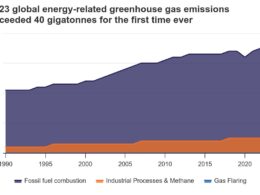The European Investment Bank (EIB), which branded itself the EU’s ‘climate bank’ in 2021, has come under fire for approving over €7 billion ($8.2 billion) in loans for road construction, airport expansions, and transport fuel projects that are likely to increase carbon emissions. The findings, published by environmental group Transport & Environment (T&E), raise questions over the bank’s alignment with its own climate commitments.
According to the analysis of the EIB’s transport loan portfolio between 2021 and 2024, the bank allocated €6.1 billion—more than three-quarters of its road infrastructure funding—to the construction of new roads. T&E criticised the practice, arguing that new motorways increase traffic and emissions while offering limited economic benefit in a region with an already extensive road network. One controversial project in Poland received €200 million despite crossing nature protection zones and generating an estimated 3,000 tonnes of CO₂-equivalent emissions. Despite this, the EIB counted the project towards its climate action and environmental sustainability spending, claiming it would enhance winter resilience.
Airport-related loans totalled €890 million, contravening the bank’s own guidelines, T&E said. These included €90 million for the expansion of Bologna Airport and €800 million for Spanish airport operator Aena’s capital investment plan, which includes enlarging Madrid airport and 12 others. T&E warned that such funding locks in high-carbon infrastructure and undermines efforts to curb aviation emissions.
The report also scrutinised EIB’s €1 billion in transport fuel-related lending, noting that six of the 17 projects focused on biofuels that cannot be sustainably scaled. Among these was a €120 million loan to Repsol for a biofuel facility in Cartagena, which allegedly depends on imported feedstocks. Investigations suggest widespread fraud in biofuel imports, with virgin oils such as palm oil mislabelled as waste-based inputs like used cooking oil or animal fats.
T&E’s sustainable finance policy officer Till Eichler acknowledged that while the EIB has made progress, significant contradictions remain. “Its continued lending of taxpayers’ money to motorways and airport expansions is adding fuel to the fire of the climate crisis,” he said. Eichler urged the bank to focus instead on emission reductions aligned with EU industrial policy, including support for domestic production of e-fuels and batteries.
On cleantech, the report found that only €700 million had been directed towards green and hydrogen-based e-fuels—technologies deemed essential for decarbonising aviation and maritime transport. While €3.9 billion was loaned to battery-related projects, just €2.5 billion supported battery manufacturing. T&E called for increased investment in cleantech components and raw materials, areas where Europe remains heavily import-dependent.
Despite the criticism, the report welcomed the EIB’s €23.6 billion in rail-related lending—the bank’s largest transport sector allocation. Rather than backing large-scale projects, funds were directed toward maintaining and upgrading existing infrastructure and procuring new rolling stock. T&E also praised the €13.3 billion in loans supporting electric buses and infrastructure for walking, cycling, and public transport in urban areas.
As the EIB prepares to revise its Climate Bank Roadmap for 2026–2030, T&E has called for a clear break from high-carbon investments. Recommendations include halting loans for new roads, airport expansions, and unsustainable biofuels; prioritising e-fuel readiness in ports; ramping up support for the EU’s cleantech manufacturing base; and continuing focus on low-emission rail and urban mobility systems.
Eichler concluded, “The Draghi report rightly highlighted how Europe must invest now to reap the benefits of the green transition. So far, that is not happening enough. The EIB must fix its roadmap to boost its support for an EU cleantech sector that is struggling to be born.”
















